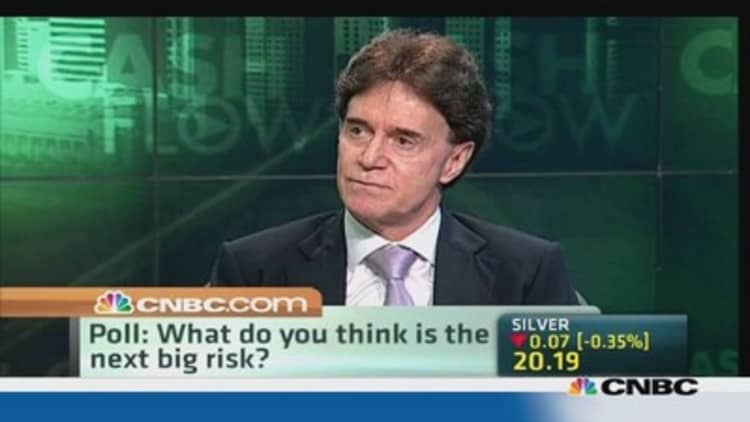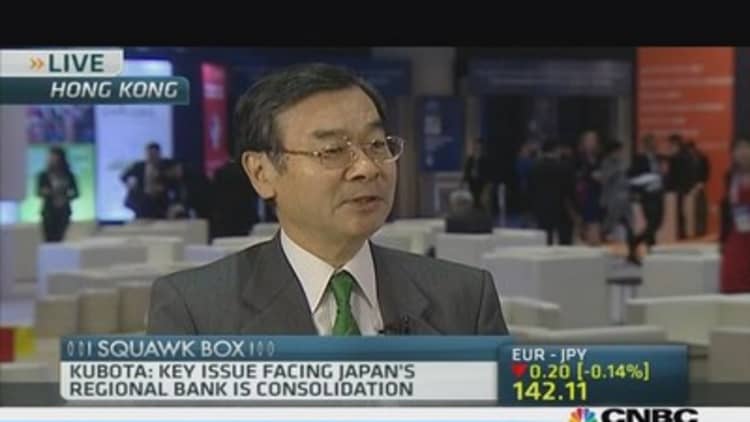
In the run-up to the Bank of Japan's policy meeting this week, some investors are speculating about a change in the central bank's inflation target, a move that analysts told CNBC could steer the nation's economic progress dangerously off track.
The two-day policy meeting concludes on Wednesday and most analysts agree that the bank is unlikely to expand its asset purchase program, with some pinpointing April for a move, and others looking further ahead to October.
According to U.K. headquartered research house Capital Economics, chatter over changes to the inflation target has been unwarranted. "There is some speculation that the board will lower its target from the current 2 percent or abandon the time horizon of 'around two years,' but this seems premature," Capital Economics analysts said in a note previewing the likely outcome of this week's meeting.
(Read more: Japan Inc, is your 'animal spirit' calling?)
"Two percent is the accepted norm among other central banks and anything less would be a major step backwards," they added.
Japan's consumer price index jumped to 1.2 percent on year in December, but some analysts remain doubtful over whether the target is achievable, fearing that the economy's deflationary symptoms are far too deeply entrenched in the economy. Recent reports have shown that some board members within the Bank of Japan are unconvinced and want the target changed.
Analysts CNBC spoke to said this would be a dangerous mistake, however.
"There has clearly been talk within the Bank of Japan about pulling their horns in, but Kuroda has stamped that out pretty quickly. It would be mad to change the wording or in any way dilute the impact of the target," said Nicholas Smith, Japan economist at CLSA.
(Read more: BOJ stands pat on policy, keeps economic view intact)
"They are certainly not going to lower the target. All of this [inflation] works on expectations, so by lowering the target they would reduce the effect of what they're doing," he added.
Last year, Japan's economy dominated the headlines as Prime Minister Shinzo Abe put his radical economic experiment - known broadly as Abenomics - into practice. The policies, which involved aggressive easing, fiscal stimulus and structural reform, and were designed to revive Japan's flagging economy and end 15 years of deflation, seem to have worked so far.
But despite the bumper inflation number at the end of last year, headwinds lurk on the horizon, mainly in the shape of the upcoming consumption tax hikes in April this year and October 2015, which many fear could damage progress made on inflation.

On Sunday, the prime minister said he would wait until the end of the year before confirming the date of the second tax hike, however, suggesting the potential for a further delay.
But Capital Economics said the Bank of Japan needed to keep its target high, and said in their view even 2 percent might not be enough to help the beleaguered economy out of its deflationary rut.
"Japan's dire public finances, low potential growth and the limited scope for austerity suggest that the country may actually need inflation of 3 percent or more to escape a debt trap," he added.
Furthermore, potential changes to the timeframe of the inflation target could also have a damaging affect, said Capital Economics. If policy makers were to switch to a vaguer timeframe, such as changing the wording to "medium to long term" or saying it would be sufficient for the 2 percent inflation target to be "in sight", these would not be favorable for the bank, they said.
(Read more: So far, Abenomics is 'close to a bull's eye')
"These alternatives would probably be more damaging for credibility and could make it harder to raise inflation expectations," they added.
However, extending the timeframe to three years would be acceptable, the research house's economists concluded, as long this target remained specific and was fulfilled.
"Our view is that the bank is most likely to keep the existing 2 percenttarget and simply push back the end-point of the time horizon by one year. This would concede that raising inflation to 2 percent on a sustainable basis could take three years rather than two, but that would of course still be a very substantial achievement," he added.
— By CNBC's Katie Holliday: Follow her on Twitter @hollidaykatie


